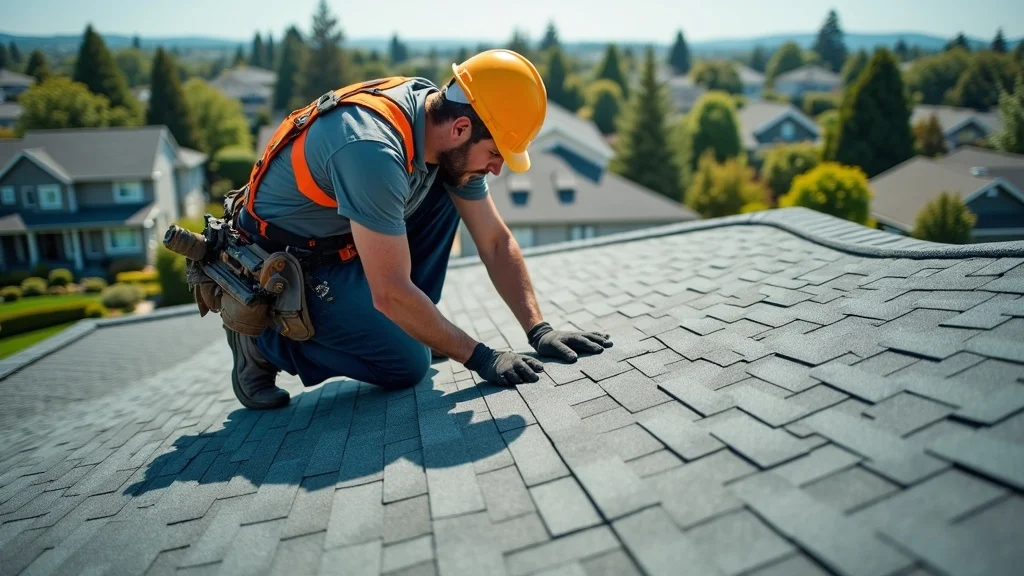Did you know that more than 70% of roofing contractors build their estimates around price competition—not value? This industry-wide habit traps countless roofers in constant price wars, thin margins, and high-stress bidding cycles.
But here’s the shift most roofing businesses never make:
The path to growth isn’t lowering your bid—it’s elevating your authority.
In this expert guide, you’ll learn how top roofing companies rise above “cheapest quote wins,” position themselves as trusted specialists, and consistently attract premium clients who value quality over price.

A Startling Truth: How the Wrong Roofing Pricing Strategy Traps Roofing Contractors
When contractors compete on price, they unintentionally turn their business into a commodity. Homeowners stop seeing you as a trusted expert and start treating you like a number on a spreadsheet. This leads to:
low-profit jobs
clients with zero loyalty
constant pressure to underbid
razor-thin margins
no budget for marketing, training, or growth
Every unexpected problem—weather delays, material spikes, on-site hazards—directly eats into your profits. Over time, price-focused roofers struggle to invest in what actually creates growth: skilled labor, professional branding, content, technology, and reputation-building.
The end result? A business defined by desperation, not authority.
What You'll Learn About Roofing Pricing Strategy and High-End Client Attraction
The pitfalls of price-based competition for roofing contractors
Why a strategic roofing pricing strategy is your key to sustainable growth
How to pivot from low-margin projects to working with premium clients
Expert guidance and actionable strategies rooted in proven authority marketing principles
The Industry Challenge: Why Roofing Contractors Rely on Price-Driven Roofing Pricing Strategy

Junk Leads, Angi/HomeAdvisor, and the SEO Maze: Traps for Your Roofing Business
Many roofers turn to Angi or HomeAdvisor hoping for easy leads. Instead, they get:
price shoppers
unqualified prospects
people collecting 5–7 bids
no loyalty
constant churn
wasted hours quoting jobs that go nowhere
Lead vendors train the market to expect the lowest price—not quality, professionalism, or expertise.
Then there’s the SEO maze. Roofers often target phrases like “cheap roofing estimate” or “lowest roofing cost,” reinforcing the exact behavior they’re trying to escape. Instead of positioning themselves as experts, their websites attract bargain hunters.
To rise above this, your marketing must showcase proof over price—content, case studies, reviews, and trust assets that highlight value, not discounts.
The Vicious Cycle: Competing on Pricing Strategy vs. Building Authority
"Own your proof, or be owned by the lie that price decides everything." – Valis Pro
Price competition is a race to the bottom. The longer a contractor stays in it, the more invisible they become to premium clients who are actively seeking reliability, craftsmanship, and professional expertise.
Authority-driven competitors win because they:
present documented proof
communicate higher standards
showcase completed projects
use clear, professional estimates
lead with trust, not negotiation
They earn higher margins, attract better clients, and grow predictably—because they’ve built a brand that justifies premium pricing.
Decoding the Roofing Pricing Strategy: Understanding Costs, Margin, and Value

Breaking Down the Roofing Estimate: Labor Cost, Material Cost, Overhead Cost
To escape the cycle of price-driven competition, understanding the core of a roofing estimate is critical. Every project involves three main components: labor cost, material cost, and overhead cost. Labor cost covers wages, payroll taxes, and workers’ compensation. Material cost includes roofing materials such as asphalt shingles, metal roofing, or specialty shingles, as well as fasteners and underlayment. Overhead cost represents business expenses not directly tied to a specific job: vehicle maintenance, insurance, office rent, marketing, and management salaries.
Failing to accurately calculate each cost leads to major surprises and undermines your roofing business’s sustainability. Many contractors make the mistake of building pricing around generalized assumptions—ballpark labor per day, standard material markups, or guessing at overhead. However, material costs and labor costs can vary significantly by region, job complexity, and even seasonality. If a contractor underestimates overhead costs or ignores the risk buffer necessary for complex installations, each “low bid” job is a gamble that rarely pays off. The path to authority begins with a transparent breakdown of every job cost, then communicating that clarity in your roofing estimate to prospects.
Low-price bidders often ignore overhead or under-calculate labor complexity—which makes every job a gamble.
Authority-driven contractors build estimates that educate clients and justify value step-by-step.
The True Total Cost: Why Hourly Rate and Square Foot Pricing Sometimes Hurt Your Roofing Business
Hourly or square-foot pricing may seem simple, but these models often:
ignore job complexity
fail to include risk buffers
don’t account for specialty materials
cause chronic underbidding
-
attract clients who don’t value expertise
Premium contractors don’t just quote pricing—they explain what makes their process, people, materials, safety practices, and warranties worth more.
This is how you stand out in a market flooded with generic bids.
Typical Breakdown of Roofing Costs by Labor, Material, and Overhead (Sample Roofing Estimate: Asphalt Shingle)
Category |
Cost (%) |
Description |
|---|---|---|
Labor Cost |
25–35% |
All wages, payroll taxes, worker benefits, and on-site expenses for your labor team |
Material Cost |
40–45% |
Roofing materials, underlayment, fasteners, flashing, and specialty components (asphalt shingles, metal roof, etc.) |
Overhead Cost |
15–25% |
Business operations: vehicle, insurance, office, equipment, marketing, licensing |
Profit Margin |
5–15% |
Target profit after all direct and indirect costs are covered |
How Price Competition Destroys Authority and Leads to Roofing Business Failure

The Authority Problem: Why High-Value Clients Avoid ‘Lowest Bid’ Roofing Contractors
Discerning homeowners or property managers aren’t searching for the cheapest roofer—they want:
safety
reliability
aesthetics
documentation
long-term peace of mind
Low pricing signals the opposite.
Premium clients do their homework. They scrutinize:
your reviews
your past projects
your processes
your communication style
your professionalism
your online presence
When seeking lasting value, they will gladly choose a contractor offering higher pricing—if that price is backed by proof: detailed case studies, vetted testimonials, informative content, and a clear process. To win these projects, your roofing pricing strategy must showcase why your labor cost, material cost, and overhead cost translate into trustworthy, long-term solutions, not just a quick fix.
If your brand is associated with being “the cheapest,” premium buyers will never trust you—no matter how good your workmanship is.
The Psychology Behind Value-Based Roofing Decisions
Educated clients want to understand:
what they’re paying for
why your estimate is structured the way it is
what protections are included
how you control risk
how you document quality
how your team operates
When you tie your pricing to:
certified labor
quality materials
warranties
safety protocols
documented proof
reliable communication
…a higher quote becomes a safer choice, not a more expensive one.
This is the heart of authority-driven sales.
The Mindset Shift: Developing a Roofing Pricing Strategy That Attracts High-End Clients

From Commodity to Consultant: Positioning Your Roofing Business Beyond Just Labor Costs
The journey from commodity provider to roofing consultant starts with mindset. Successful contractors stop competing on price alone and instead build authority by educating clients, providing transparent estimates, and sharing documented results. Rather than listing out labor costs and material costs as if they’re all equivalent, these experts clarify what sets their process, people, and roofing materials apart.
Begin by documenting every proof point: before-and-after photos, project timelines, quality control standards, and manufacturer partnerships. Use your website and proposals to show how you solve complex problems for clients. Highlight safety certifications, warranty offers, and exclusive premium system installations. The best roofing pricing strategy proves that every dollar the client spends is an investment that secures their property value, comfort, and peace of mind for years to come—transforming any estimate into a story of reliability and partnership.
Building Trust and Reputation: Content, Reviews, and a Strong Roofing Contract

Authority-driven roofers don’t sell labor—they sell outcomes.
They reposition their estimate as a professional proposal, not a price sheet.
Here’s how to make the shift:
1. Document your proof
Before/after photos
Quality standards
Installation processes
Manufacturer partnerships
2. Showcase real results
Case studies
Testimonials
Warranty performance
Safety record
3. Educate instead of negotiate
Explain the “why” behind your pricing—not defensively, but confidently.
4. Build a reputation engine
Content, reviews, and consistent online presence attract ideal clients long before they ever ask for a quote.
Proven Steps: Roofing Pricing Strategy for Branding, Authority, and Premium Projects
Audit your material costs, labor costs, and overhead costs for real ROI
Showcase craftsmanship and proof across your website and proposal
Document case studies that demonstrate quality and results
Build a review acquisition system that highlights expertise, not price
Control your pipeline—don’t rely on Angi, HomeAdvisor, or vendor leads
Position your brand as an expert, not a bid factory

"Cheap prices attract cheap results. Authority attracts quality clients."
People Also Ask: Roofing Pricing Strategy Questions Answered
What is the 25% rule for roofing?
The 25% rule refers to allocating roughly 25% of the roofing estimate to labor costs, with the remainder covering materials, overhead, and profit.
How do you price roofing work?
Factor labor, materials, overhead, and desired profit margin. Avoid relying solely on per-square-foot pricing—communicate value instead. A winning roofing pricing strategy communicates expertise and quality to prospective high-end clients.

How much should I charge per square foot?
Rates vary based on region, materials, and job complexity. High-end clients respond better to value clarity than raw square-foot numbers.

Key Takeaways for Roofing Contractors: Crafting a Roofing Pricing Strategy That Leads to Authority
Price-based competition is a trap: Roofing pricing strategy must articulate value
Authority and proof attract high-quality clients and premium projects
Sustainable growth comes from content-driven reputation and strategic branding
Review, refine, and own your roofing pricing strategy for a winning business model
Roofing Pricing Strategy FAQs
How can content marketing support my roofing pricing strategy?
Content marketing builds trust and demonstrates your expertise to potential clients. Informative guides, project profiles, and educational videos help you stand out from price-only competitors and attract premium leads looking for quality over low cost.What role do customer reviews play in winning high-end projects?
Genuine customer reviews are powerful proof of your quality and reliability. They reassure prospects that your higher estimate reflects real value, reducing price resistance and building a reputation for excellence.Are there software tools to help automate and optimize roofing estimates?
Yes! Roofing estimate software platforms allow quick, accurate estimates that incorporate labor, material, and overhead costs. Many digital solutions include templates, integrations, and job tracking to help you manage profit margins and client expectations.How should I handle objections to my pricing from prospective clients?
Address objections by explaining how your roofing estimate is built—from labor costs to roofing materials to warranty coverage. Use testimonials, photos, and clear contracts to reinforce that your pricing is an investment, not just an expense.

Conclusion: Your Next Step in Roofing Pricing Strategy and Business Growth
If you’re ready to stop competing on price and start commanding authority in your market, book your Roofing Authority Positioning call with Valis Pro today and discover how an authority-based roofing pricing strategy can change your business forever.
Sources
To enhance your understanding of effective roofing pricing strategies, consider exploring the following resources:
“How to Bid a Roofing Job: An Easy Guide to Pricing Roofing Work” (getjobber.com)
This guide offers a step-by-step approach to accurately pricing roofing projects, covering essential aspects such as labor, materials, and overhead costs.
“How to Handle Rising Roofing Costs Without Losing Customers” (acornfinance.com)
This article provides strategies for managing increasing material costs while maintaining customer satisfaction, including tips on quoting practices and communication techniques.
By delving into these resources, you’ll gain valuable insights into developing a pricing strategy that balances competitiveness with profitability, helping you attract high-end clients and sustain business growth.
 Add Row
Add Row  Add
Add 

Write A Comment